Anarchist communism is a political philosophy and anarchist school of thought that advocates communism. It calls for the abolition of private property but retention of personal property and collectively-owned items, goods, and services. It supports social ownership of property and the distribution of resources "From each according to his ability, to each according to his needs".
The Argentine Libertarian Federation is a libertarian communist federation which operates in Argentina, out of the City of Buenos Aires, San Pedro, La Pampa Province, and Rosario. Founded in October 1935 with the name of the Anarcho-Communist Federation of Argentina the FLA adopted its current name in 1955. It is governed by the Declaration of Principles and the Organic Charter approved by its congress. Its structure and operation are federative and are coordinated by Local Councils and the National Council.
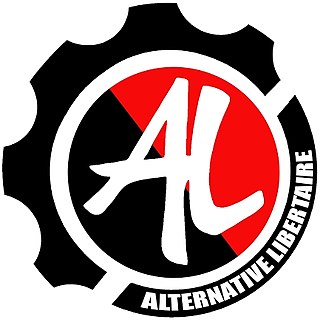
Alternative libertaire was a French anarchist organization formed in 1991 which publishes a monthly magazine, actively participates in a variety of social movements, and is a participant in the Anarkismo.net project. In 2019 the organization merged into the Union Communiste Libertaire
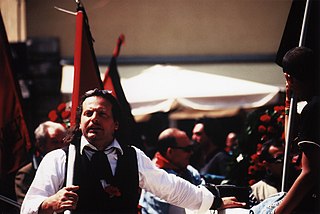
Anarchism in France can trace its roots to thinker Pierre-Joseph Proudhon, who grew up during the Restoration and was the first self-described anarchist. French anarchists fought in the Spanish Civil War as volunteers in the International Brigades. According to journalist Brian Doherty, "The number of people who subscribed to the anarchist movement's many publications was in the tens of thousands in France alone."

Fédération Anarchiste is an anarchist federation in France, Belgium and Switzerland. It is a member of the International of Anarchist Federations since the latter's establishment in 1968.

Francesc Pi i Margall was a Spanish federalist and republican politician and theorist who served as president of the short-lived First Spanish Republic in 1873. He was also a historian, philosopher, romanticist writer, and was also the leader of the Federal Democratic Republican Party and the Democratic Party. Pi was turned into a sort of secular saint in his time.

Maria Suceso Portales Casamar was an Extremaduran anarcho-feminist.

Juan López Sánchez was a Spanish construction worker, anarchist and member of the Confederación Nacional del Trabajo, and one of the founders of the Federación Sindicalista Libertaria. During the Spanish Civil War (1936–1939) he was Minister of Commerce under Francisco Largo Caballero. After the war he spent several years in exile before returning to Spain where he lived without persecution and participated in the "vertical" trade union movement authorized by the dictatorship of General Francisco Franco.
Le Libertaire is a Francophone anarchist newspaper established in New York City in June 1858 by the exiled anarchist Joseph Déjacque. It appeared at slightly irregular intervals until February 1861. The title reappeared in Algiers in 1892 and was then produced in Brussels between 1893 and 1894.
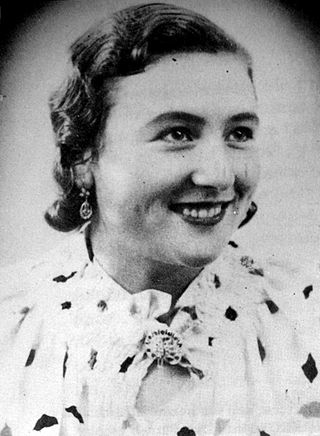
Sara Berenguer Laosa (1919–2010) was a Catalan anarcho-syndicalist and anarcha-feminist writer, who was active in the Mujeres Libres movement.
Georges Fontenis was a school teacher who worked in Tours. He is more widely remembered on account of his political involvement, especially during the 1950s and 1960s.
Pierre Morain was a building worker, a trades unionist, a militant libertarian communist and an anti-colonialist activist. For most purposes he would be considered a Frenchman. However, when he faced trial in connection with a newspaper article he had written opposing the government position in respect of the Algerian War, the president of the court noticed that his nineteen co-defendants were all Algerian and felt it necessary to clarify Morain's nationality: "But you .. are nevertheless French". Morain's defiant clarification is often requoted when Pierre Morain is discussed: "No, I'm not French. I'm a worker". When he was arrested on 29 May 1955 Morain became the first French anti-colonialist activist to be sent to prison for supporting Algerian independence.
Paul Lapeyre was a militant anarchist, anarcho-syndicalist and free-thinker.
Anarchism in Portugal first appeared in the form of organized groups in the mid-1880s. It was present from the first steps of the workers' movement, revolutionary unionism and anarcho-syndicalism had a lasting influence on the General Confederation of Labour, founded in 1919.
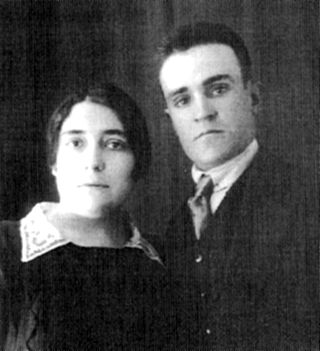
Juan Manuel Molina Mateo, also known as Juanel, was a Spanish anarcho-syndicalist militant of the National Confederation of Labor and a founding member of the Iberian Anarchist Federation.
Anarchism spread into Belgium as Communards took refuge in Brussels with the fall of the Paris Commune. Most Belgian members in the First International joined the anarchist Jura Federation after the socialist schism. Belgian anarchists also organized the 1886 Walloon uprising, the Libertarian Communist Group, and several Bruxellois newspapers at the turn of the century. Apart from new publications, the movement dissipated through the internecine antimilitarism in the interwar period. Several groups emerged mid-century for social justice and anti-fascism.
André Bösiger was a Swiss anarcho-syndicalist. An activist of the Building Action League in Geneva, he collaborated with the Réveil anarchiste and the International Center for Research on Anarchism (Lausanne).

Lucien Tronchet (1902–1982) was a Swiss anarcho-syndicalist activist. An emblematic figure of trade unionism in Geneva, he took action alongside Italian anti-fascist refugees and Spanish libertarians during the Spanish Civil War. A convinced antimilitarist, he spent two times, in 1920 and 1940, in prison for "refusing to serve" in the Swiss Army.

Marcel Dieu was a Belgian book dealer, essayist, editor-publisher-compiler, militant antimilitarist and libertarian socialist. Friends and admirers such as the lawyer Paul-Henri Spaak saw a connection between his decision to become a vegetarian and his father's profession as a butcher.
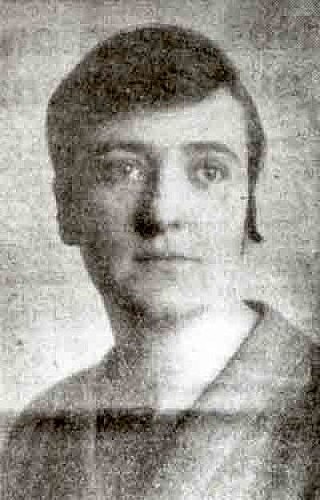
Émilienne Léontine Morin was a French anarcho-syndicalist, shorthand typist and partner of Buenaventura Durruti. In 1936, she was part of the Durruti column, an anarchist military unit, during the Spanish Civil war. She was nicknamed "Mimi-FAI" after the Federación Anarquista Ibérica (FAI).











